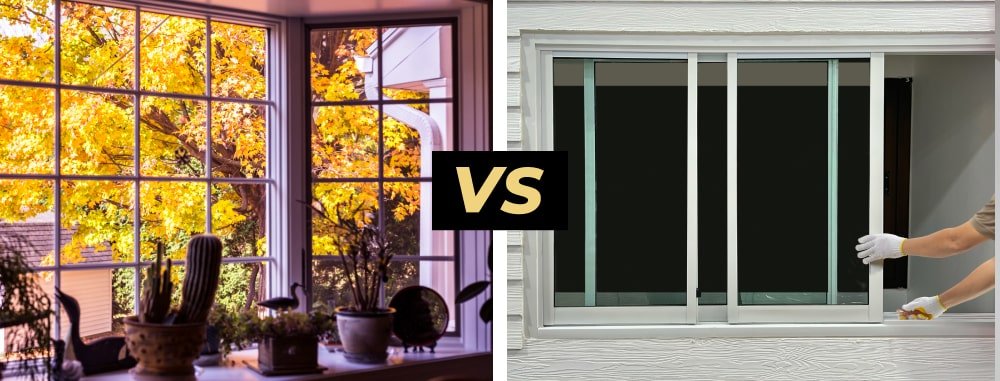
Casement vs Sliding Windows
In essence, two of the most often used window types for homes are sliding windows and casement windows. Every kind has special benefits; the finest one for you will usually rely on your particular requirements and taste. With an eye toward their design, utility, cost, and materials, we shall investigate in this article the main variations between these two window kinds. We will also look at the advantages and drawbacks of every, thereby guiding your choice on which would be ideal for your house.
For more detailed information, you can check out our guides for casement windows, single-slider windows, double-slider windows, and our window replacement costs.
Key Takeaways
- Design and Operation: Casement windows are similar to doors in that they open outward, but sliding windows move horizontally along tracks or tracks.
- Ventilation: Casement windows give improved ventilation as they may open fully, collecting more air. Sliding windows enable just one side of the window to open at a time.
- Cost: Sliding windows tend to be more economical due to their simpler mechanism, whereas casement windows, with their more intricate function, might be more expensive. You can read more about window replacement costs here.
Casement Window Definition
Like a door, casement windows hinged on one side open outward. Usually via a crank or lever, they move the window outward from the side. This form maximizes airflow by letting the whole window open. Tight seal when closed makes casement windows famous for their great energy efficiency and weather resilience.
Sliding Window Definition
Operating horizontally along a track, sliding windows—also known as slider windows—have There are two popular types: single-slider and double-slider. One fixed pane and one sliding, horizontally moving pane define single-slider windows. Greater flexibility comes with double-slider windows, which let both panes move. Their simplicity and broad perspective of the outside make sliding windows especially appealing.
Materials Used for Casement & Sliding Windows
Every single one of Big City Windows' casement and sliding windows is constructed out of polyvinyl chloride, sometimes referred to as PVC. The following are some of the reasons why PVC is an outstanding material choice:
- Durability: PVC windows are resistant to corrosion, rust, and weather damage, ensuring a long lifespan.
- Cost-effectiveness: PVC is a more affordable option compared to materials like wood or aluminum while still offering great performance.
- Design flexibility: PVC can be shaped into various styles and designs, allowing for customization to match your home's aesthetics.
Selecting PVC for your sliding windows or casement guarantees a product with dependability, low maintenance, and efficiency.
Cost Differences of Casement Windows vs Sliding Windows
Sliding windows' simpler design and operation help them to be usually the more reasonably priced choice. Because of their more complicated opening mechanism, casement windows can cost somewhat more. Still, size, customizing, and installation costs will all affect the price of either kind of window.
Casement Window Pros
- Great ventilation: Casement windows let the most airflow into your house open totally outward. For places like kitchens or living rooms where you desire a breeze, this makes them a perfect fit.
- Energy saver: Tight seal created by casement window design when closed helps to avoid drafts and hence increase energy efficiency. Reduced heating and cooling costs can follow from this.
- Unobstructed Views: Casement windows improve the visual attractiveness of your house by offering a clear view of the outside without a central rail or bar.
Casement Window Cons
Limited Size Options: Since their size is often limited to guarantee appropriate operation, casement windows might not be the best choice for rather huge window openings. With their greater size possibilities, sliding windows may, however, cover this void and provide wide window choices for larger areas.
Sliding Window Pros
- Sliding windows are rather straightforward for operation. Their basic horizontal sliding mechanism calls for little effort, hence they are a fantastic choice for difficult access areas.
- Superior Affordability: Sliding windows' simpler design and fewer moving components than casement windows help them to be usually more reasonably priced.
- Sliding windows are a great option for vast areas, such living rooms or over kitchen sinks since they are bigger than casement windows.
Sliding Window Cons
One drawback of sliding windows is that, compared to casement windows, they offer less airflow. Only one-half of the window can be opened at a time, limiting the airflow. Still, the simplicity of usage and more expansive size choices help to offset this restriction.
Which One Should You Choose?
Your priorities define whether of sliding windows or casement windows you choose. Casement windows are the ideal option if you need perfect ventilation and energy economy. Sliding windows could be the greatest choice if, on the other hand, your priorities are cost-effectiveness, user-friendliness, and a wide view.
Both window types offer great benefits and are made from durable, cost-effective PVC when you choose Big City Windows. Whether you're looking for casement windows or sliding windows, Big City Windows has a variety of options to suit your needs. Don’t forget to check out the cost breakdown for window replacements to help guide your decision.
Ultimately, depending on the necessity of your house, both casement and sliding windows are great options; each offers special benefits. Contact Big City Windows and Doors for an expert’s opinion on which window configuration works best for your home.






